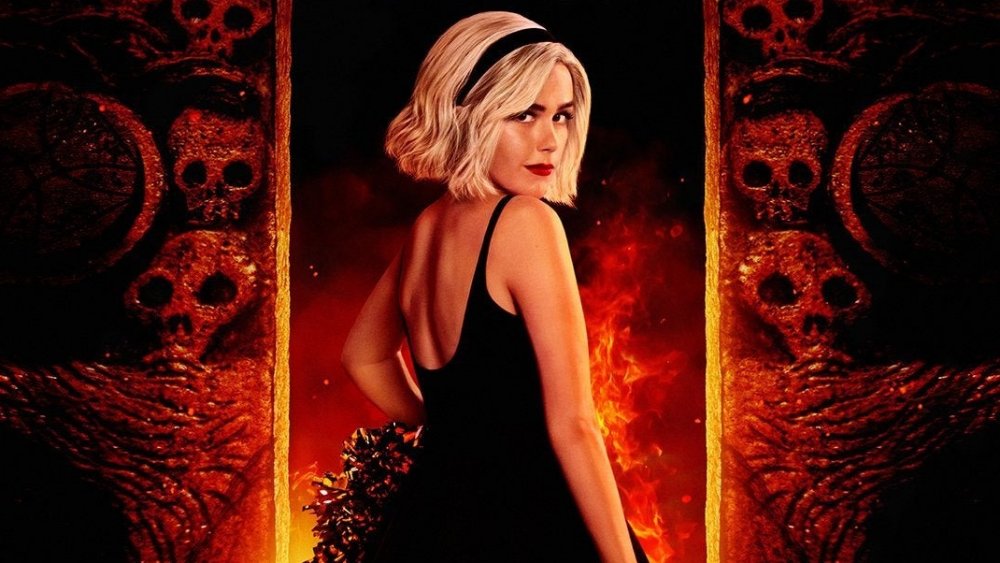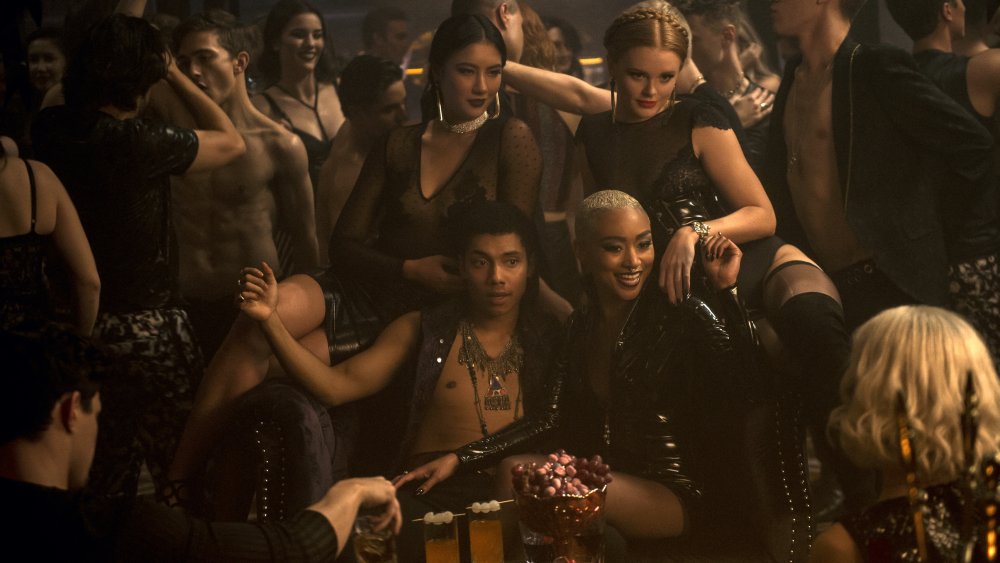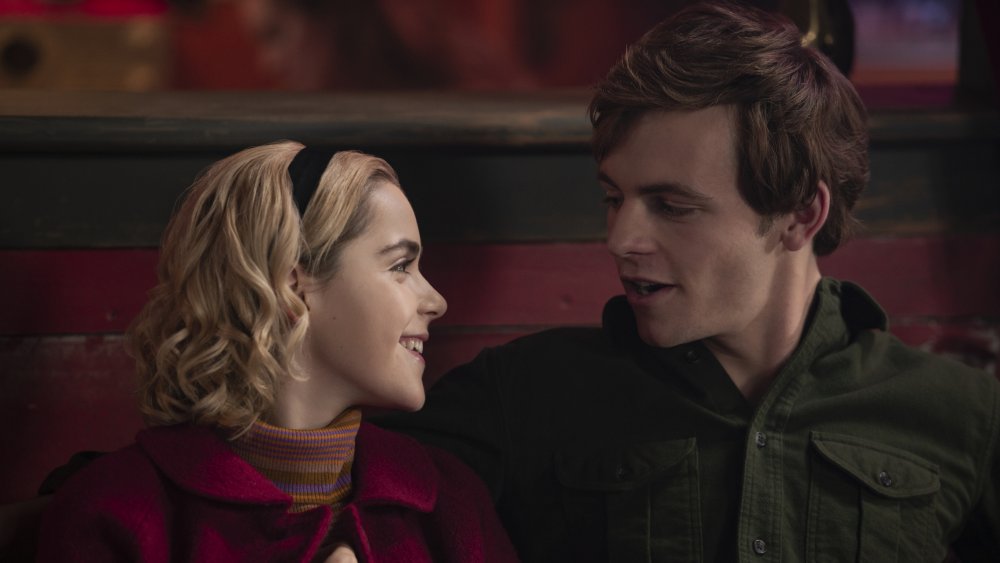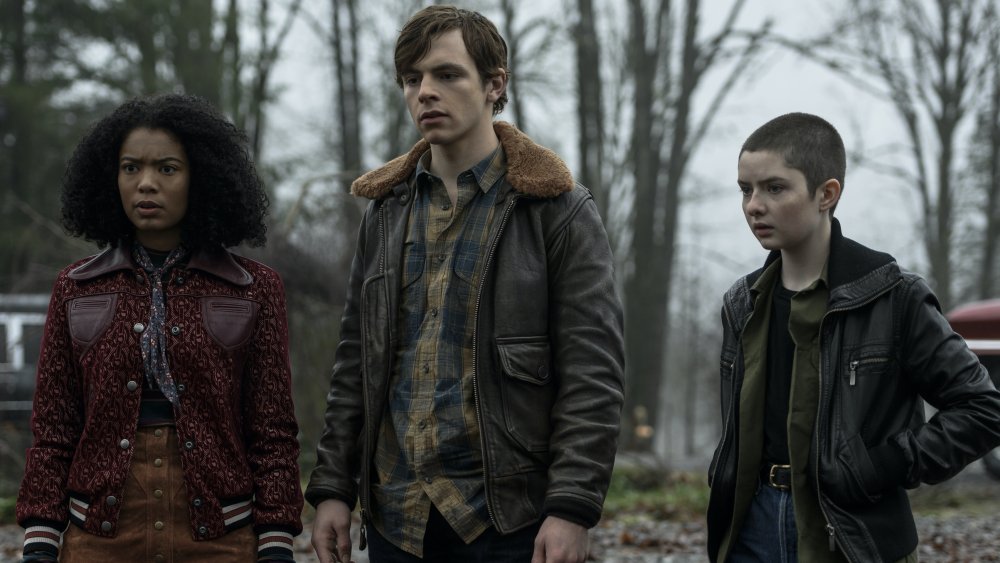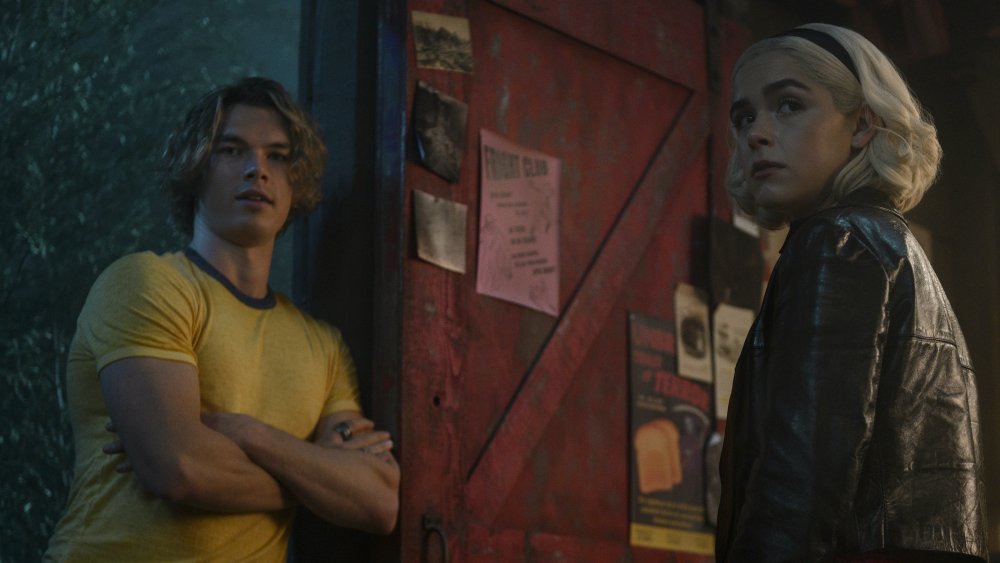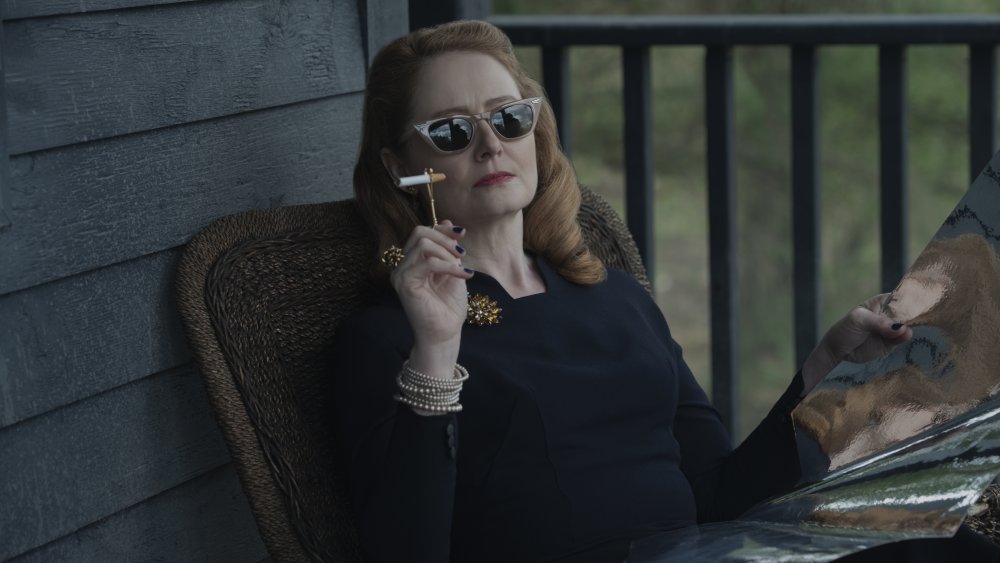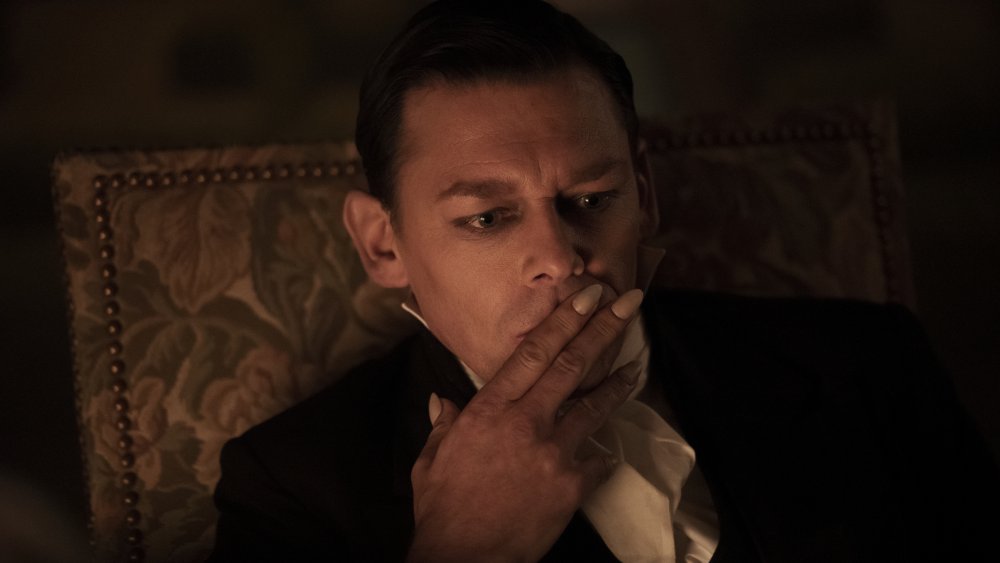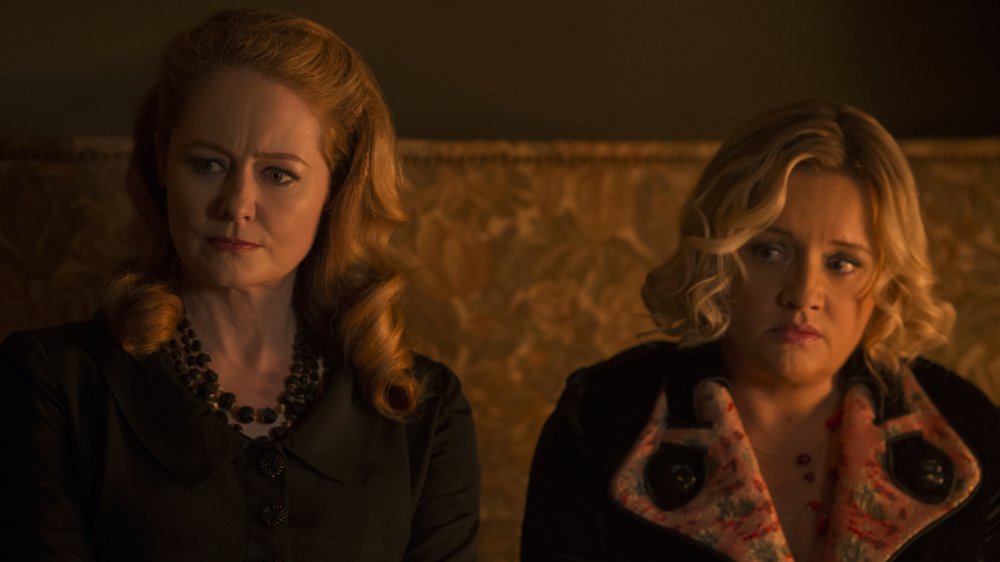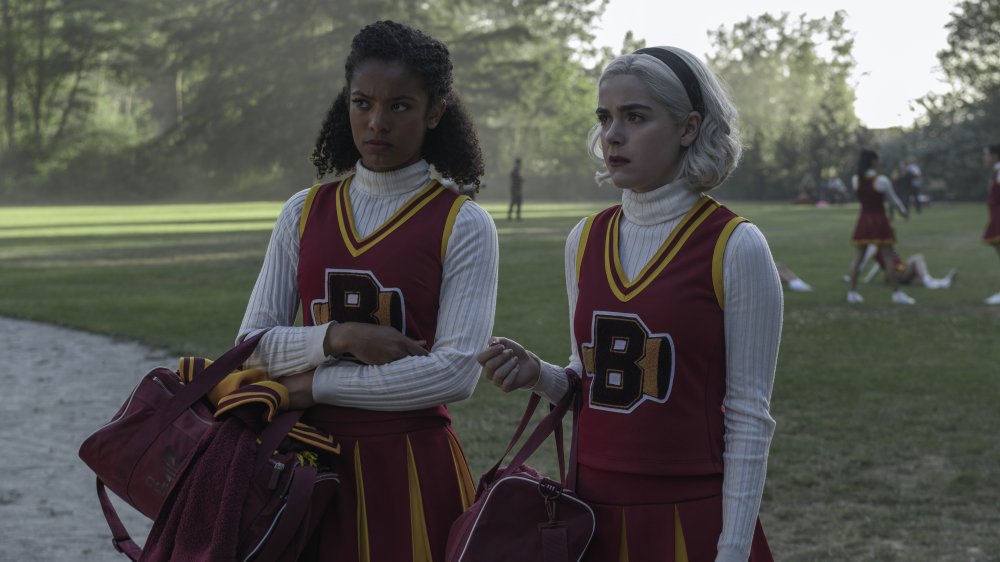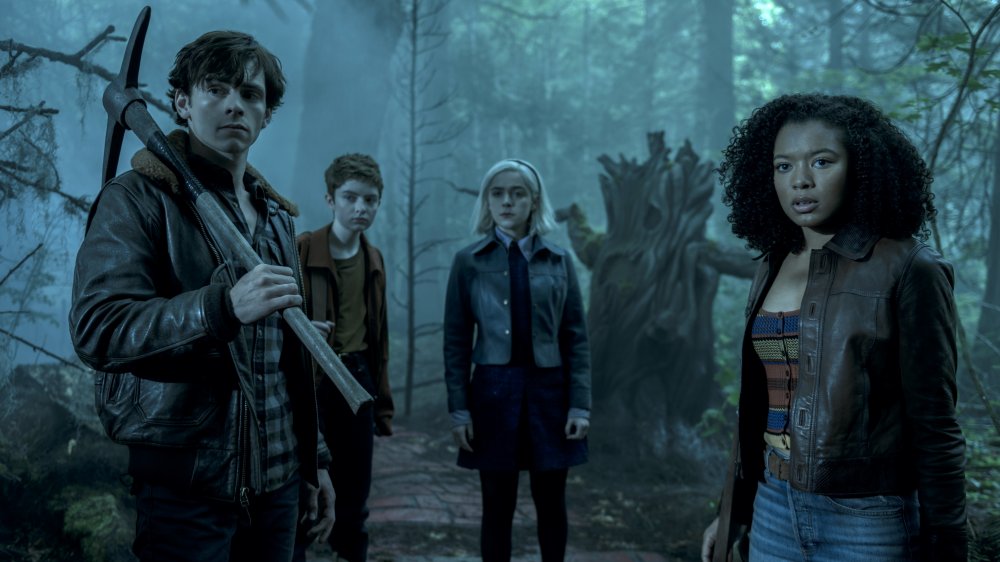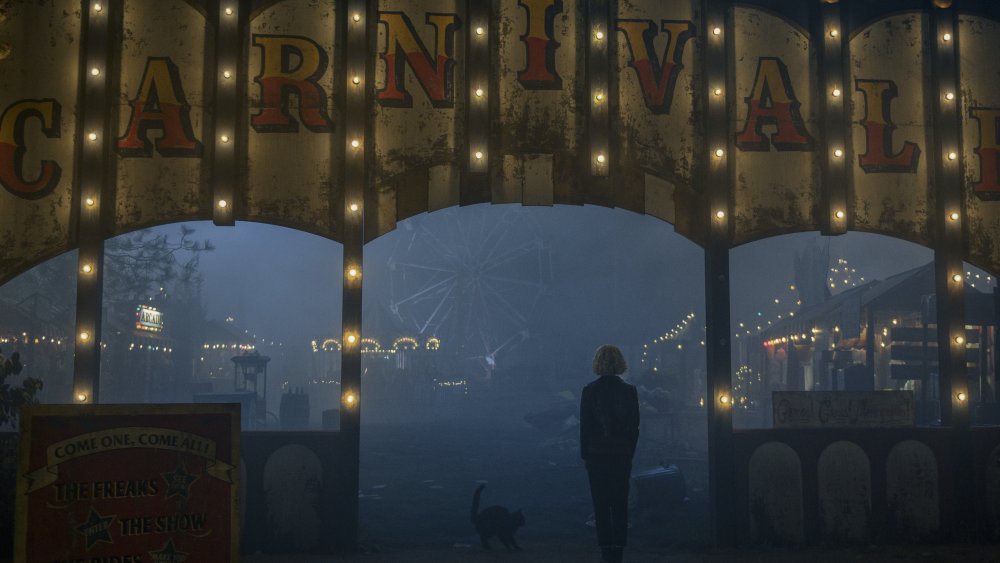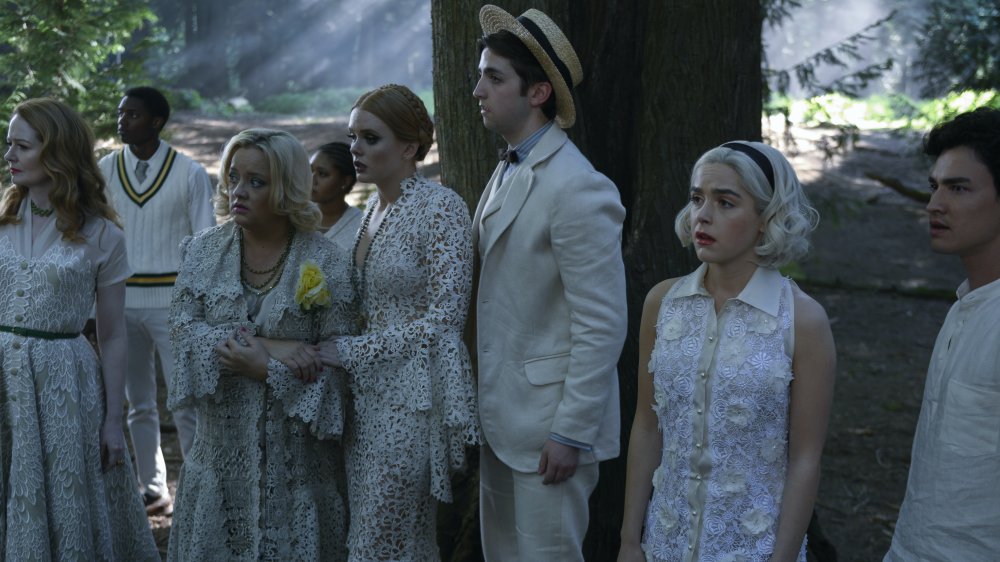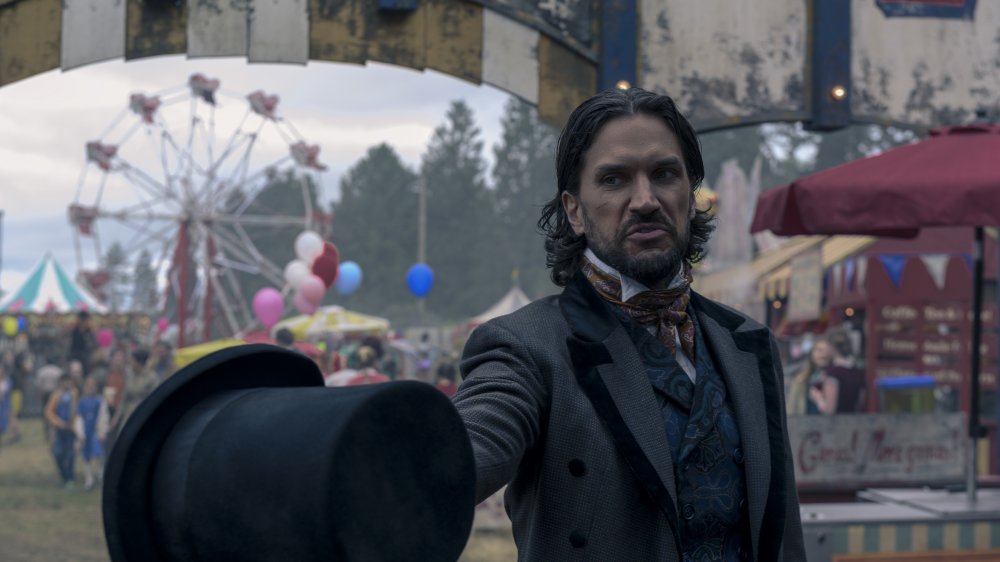Things Only Adults Notice In The Chilling Adventures Of Sabrina
Laughing at a movie or show because adults are laughing is a rite of passage as a child. While Chilling Adventures of Sabrina is rated TV-14, it's entertaining for teenagers and adults alike. It's also an adaptation of Sabrina the Teenage Witch (although a rather dark version), likely giving parents the impression that it's okay for their children.
Either way, that's not what this conversation is about — this conversation is about occurrences throughout the show that you only notice as an adult.
Chilling Adventures of Sabrina is flooding with these types of occurrences, from the art of being woke, to privilege, self-entitlement and toxic masculinity, to an orgy scene. Yeah, Sabrina really is a show for people who are 14-plus, despite being adapted from a relatively safe show about a teenage witch and Archie Comics characters.
The coming-of-age saga of a witch and her dark and eerie world(s) goes from zero to 100 fast — and here are things only adults notice in Chilling Adventures of Sabrina.
Let's talk about that orgy scene in season 1...
Not many parents watching with children appreciated the orgy scene in season 1, and understandably so. The biggest issue, despite the show being labeled TV-14, is that the characters partaking in the orgy are presumably teenagers.
It's more complicated than that, as some of the witches might take residence in teenage vessels but are actually much older. Nick Scratch (Gavin Leatherwood), for example, might be 50 years old. Ambrose Spellman (Chance Perdomo) is more than 75 years old. That doesn't make it any less appropriate for the audience, however, especially since Sabrina Spellman (Kiernan Shipka) was invited to join and was only 16 at the time.
As an adult, it's quite obvious that there's an orgy in season 1, and the elements of the scene can be viewed as inappropriate for a show about witches and, most importantly, teenagers. Whether carrying the TV-14 label or not, CAOS is clearly a much darker and, well, more mature version than the previous TV edition of Sabrina.
The love relationships are typical teenager/high school relationships
While adorable, the relationships between Sabrina and Harvey Kinkle (Ross Lynch), Harvey and Roz Walker (Jaz Sinclair), Sabrina and Nick, and Theo Putnam (born Susie Putnam, and played by Lachlan Watson) and Robin Goodfellow (Jonathan Whitesell) are typical teenager/high school relationships.
Everyone's different but in many young relationships, couples let their emotions fly because they're feeling what they're feeling for the first time. Characteristics include saying "I love you" early on in a relationship, not quite understanding personal space, always hugging and kissing (typical of new relationships), and acting as if the other person is the entire world.
Every person and relationship is different, but people in new couples, especially for the first time, rush toward this-is-my-soulmate status during the honeymoon period, likely due to hormones, self-discovery, and encountering a new form of love. There's nothing wrong with that — as long as people, as well as witches and warlocks, learn from their past relationships and respect one another.
The younger people are fearless and independent
The younger characters of Chilling Adventures of Sabrina tend to believe they (and only they) can solve problems, which actually isn't a bad belief to carry over to adulthood — if a person wants something done right, then he or she needs to do it himself or herself.
Harvey and Sabrina especially share this belief. Harvey wanted to go into the collapsed mines to try to save his brother and other workers. Sabrina routinely does things behind her aunts' backs because she probably believes if everything goes right, which it usually doesn't, then there's no reason to bother them.
The younger people — let's throw Roz and Theo in there as well — don't always ask for permission. They see a problem, such as Roz freezing from the inside out and eventually turning to stone, and go into supernatural zones guns blazing. While they appear to be fearless and independent, they're not invincible, not even Sabrina. Luckily, everything mostly works out for Roz, Theo, Harvey, and Sabrina.
Sabrina is constantly in over her head
Most people can only handle one job. Sabrina somehow manages a love relationship, school, and being the Queen of Hell, while also being the perfect little witch for her aunties and Ambrose, a good friend, and a cheerleader for good measure. All of those jobs lead to one place: Burnout station.
Sabrina is tasked with saving the world, in multiple time dimensions, in the season 3 finale. Before that quest, Sabrina was turned to stone by the Prince of Hell, Caliban (Sam Corlett). Before that, the pagans were trying to take over Earth (which they did) and her coven was battling witch power problems... all while Lucifer (Luke Cook) and Faustus Blackwood (Richard Coyle) needed to be dealt with.
Sabrina is overworked and constantly in over her head because she has a hero complex — she always feels the need to save people. After the season 3 finale, it's clear that Sabrina deserves the witch of the year award.
Zelda is privileged and self-entitled
Zelda Spellman (Miranda Otto) might seem like a mean/moody aunt to kids, but she's kind of just privileged and self-entitled. Case in point: the way she smokes cigarettes.
Zelda is old-fashioned and proud of the Spellman name (she wants to return the family back to the glory days, and Sabrina is the ticket), but just because someone's brother was mighty and powerful, that doesn't mean offspring or family members deserve everything handed to them. Even still, Zelda is blessed with witch powers, a happy makeshift family, and a coven, which are things she worked at and for, but it's still a privilege to have those luxuries.
Zelda's character begins to develop (especially in season 3) and even tells Sabrina and Hilda Spellman (Lucy Davis) "thank you" in her own awkward way. Zelda is high class and believes Spellmans should act a certain way — there's nothing wrong with that as expectations can be beneficial, but just because she and her family are Spellmans and witches, it doesn't mean they're owed the world. Zelda, Sabrina, and the rest of the family have to pave their own path.
All of that said, Zelda is treated like trash by some of the male characters and likely has been minimized her entire life by similar male authority, so it's understandable why she acts the way she does, especially if she was considered royal status during Edward Spellman's (Georgie Daburas) peak.
Faustus Blackwood's toxic masculinity
Once again, younger viewers might think Faustus Blackwood is just mean — and he is, but he's also bursting at the seams with toxic masculinity. He dictates and tells his coven what to do, and rewards the witches and warlocks who please him while punishing the ones who don't.
He feels no remorse for the supposed loss of a child (which Zelda stealthily hides) or his wife, Constance Blackwood (Alvina August), who dies during childbirth. His main concern is that his baby is a boy and although he has powerful offspring already, such as Prudence Blackwood (Tati Gabrielle), this baby boy is the child who finally makes him proud, even victorious... just because of its gender.
Blackwood isn't the only example of toxic masculinity. Harvey's dad believes his son is soft and wants him to work in the mines, the football players act like stereotypical jocks in that they are obnoxious and can get away with anything, and countless other examples. When added up, it's no wonder Zelda acts the way she does in seasons 1 and 2.
Aunt Zelda and Hilda have a codependent relationship
It might seem like it's "Pick on Zelda Day" and that's not the case, but... Zelda and Hilda have a codependent relationship. While Hilda strays away from this as she falls for Dr. Cee (Alessandro Juliani), the aunties have the same room for a good period of time. They also help raise Sabrina.
Zelda is the more forceful aunt and a stickler for rules and Hilda is nice, pleasant, and actually seems like a fun person to be around. Oddly enough, their true nightmares are made known in season 1 during Batibat's (Megan Leitch) brief takeover. Hilda fears she'll be stuck with Zelda forever and Zelda fears she'll lose Hilda.
The aunts balance each other out and tend to have conflicting views, such as Zelda being pro-Church of Night and Hilda questioning it. Zelda might throw shade at Hilda, as well as her rising status as Hilda's declines, but it's evident they love each other. Zelda only wants what's best for her sister and it appears she believes that comes in the form of restoring the status of the Spellman name.
Sabrina is too young for her coven
Sabrina is only 16 years old and everyone else, while they're wearing young vessels, are likely much older. She's too young to date them, she's too young to take on the burdens of the coven that she bears (such as saving the world), and frankly, most parents wouldn't let their 16-year-olds hang out with people in their 50s, let alone 20s.
The witch world — Sabrina's world — works differently than most, though. For one, witches and warlocks age slower than humans, which is why Sabrina and Nick look around the same age and it's perceived to be appropriate for them to date despite him being much older. Sabrina is the same age as her human friends.
Time and age get thrown for a loop in season 3 as Sabrina is turned to stone for decades, according to the narrator (Ambrose's voice) at the start of the season 3 finale. The season ends with two versions of Sabrina, one ruling hell and the other battling high school, her aunts, and the human world, creating a time paradox and making witch time even tougher to follow.
The characters are super woke
One of the most appealing parts of Chilling Adventures of Sabrina is that the characters living in this retro world are super woke. They routinely question social norms and traditions, such as Sabrina running for "Top Boy." Or Sabrina, Roz, and Theo forming a club (Women's Intersectional Cultural and Creative Association). Or Theo trying out for the basketball team. Or Sabrina being a student, cheerleader, the Queen of Hell, and whatever she puts her mind and heart to.
Chilling Adventures of Sabrina tackles social issues and norms on an episode basis, from transgender rights to women's rights, whether subtly or making an entire episode about one issue. The characters don't have every issue figured out just yet — cannibalism is still a thing witches do, for example, which Sabrina makes note of this in the season 1 finale when she asks, "Seriously, what is it with witches and cannibalism?"
Despite being frozen in the '60s, Chilling Adventures of Sabrina is full of characters who don't let norms and traditions limit or define them.
Currency, one of real life's biggest problems, doesn't seem to be a problem
Money is never really a central issue in Chilling Adventures of Sabrina. Or an issue. Or in existence. How do the witches (let alone humans, but most importantly the witches) continue to buy food, ingredients for spells, or pay bills? Many characters only seem to care about power, status, instant gratification, and emotions. Maybe it's assumed the Spellmans have family money? Maybe if a coven follows its Dark Lord all needs and necessities are provided?
Hilda works for Cerberus Books, but that's more out of boredom and wanting to get out of the house than making next month's rent (although her home is probably paid off by now). Theo gets a job, but it's only because Theo's always wanted to be the holiday elf, Jingles. Money is mentioned when Roz's father asks for donations from his parish to pay for her eye operation. Finally, one reference to the thing that makes the world go round.
Chilling Adventures of Sabrina tackles many important issues, but it doesn't really discuss money. Apparently, something as trivial as currency doesn't do anything to enhance a show about witches and magic, making it unnecessary until it isn't.
Witches are really serious about their holidays
If viewers thought humans took the holidays seriously, then they've never decked the halls with witches. During the holiday special, Sabrina and her family celebrate the winter solstice, similar to Christmas in the sense of there being a Yule tree, presents, baking, apple cider, roasted chestnuts, and holiday cheer and music. Zelda lights the Yule log for protection, not decoration, and the log must burn through the shortest day and longest night to ward off malevolent forces and creatures. The lighting is followed by a Solstice blessing.
In typical Chilling Adventures of Sabrina fashion, this holiday episode goes off the rails, yet the Spellman family is still cheerful at the end and ready to celebrate more. Near the end of the episode, Ambrose says, "Aside from the home invasion and child abduction, I'd say this was a rather merry Solstice." The Spellmans proceed to toast in the season one finale. "It is tradition."
The Spellmans are all about holding traditions and keeping their Dark Lord happy (although that changes thanks to Sabrina), which is an obvious reason why they take their holidays seriously — an unhappy Dark Lord could presumably lead to doom.
Like, where are the cops?
In season 3, the jocks take baseball bats and make singles and doubles out of the carnival. Cops and authorities don't show up to stop them. There's also that time when Harvey carries a rifle all the way to the carnival without being stopped and clearly has plans to use it.
The police (or any form of authority) aren't present when a little girl goes missing in season 3. They're only briefly referenced, similar to when Theo goes missing in the season 1 finale. Roz mentions Theo's father talking to the police, but the audience never sees them.
Ideally, the police would go straight to Mr. Bartel's (Brian Markinson) house, since, as Zelda points out, the address is in the Greendale White Pages and Mr. Bartel is Theo's boss and Theo was last seen at work. Mr. Bartel plays Santa and is actually a Yule demon, which the police don't need to know to check his house for possible child abduction. Of course, the authorities could have gone to his house and no one answered. A show doesn't have to show everything.
Nonetheless, it's hard not to wonder about all this as an adult viewer. Luckily for the humans (and witches), Sabrina and the rest of the Spellmans take justice into their own hands.
